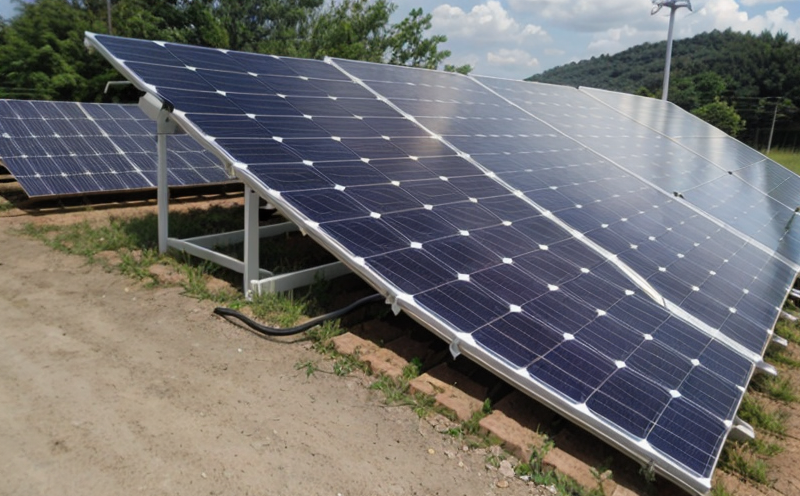ASTM E2481 Electrical Insulation Integrity Testing
The ASTM E2481-19 standard is a critical method used to evaluate the electrical insulation integrity of solar panels and photovoltaic (PV) modules. This testing ensures that the insulating materials within these devices are capable of withstanding high-voltage stresses without compromising their performance or leading to potential hazards.
The primary focus of ASTM E2481 is on the electrical properties of the insulation in PV modules, which plays a crucial role in the overall safety and efficiency of photovoltaic systems. The test aims to determine whether the insulation can maintain its integrity under specific voltage stress conditions that simulate real-world operating environments.
The testing procedure outlined in ASTM E2481 involves subjecting the insulating materials to an alternating current (AC) or direct current (DC) voltage stress. This method ensures that any flaws, defects, or weaknesses in the insulation are exposed and quantified. The test is particularly important for ensuring that solar panels can operate safely and efficiently over their entire lifespan.
For effective testing according to ASTM E2481, it is essential to follow a stringent set of procedures. Specimen preparation involves selecting representative samples from the production batch or lot. These specimens are then subjected to controlled environmental conditions to simulate real-world exposure before undergoing voltage stress.
The test apparatus used in ASTM E2481 includes high-voltage testing equipment capable of providing precise voltage stresses up to 5000 volts AC or DC. The setup typically involves a voltage generator, current measuring devices, and a system for monitoring the insulation's response under stress conditions. This instrumentation ensures accurate measurement and recording of test results.
The acceptance criteria for ASTM E2481 are based on the absence of breakdowns or flashovers in the insulating materials during the specified voltage stresses. If the insulation passes these tests, it can be concluded that it meets the necessary electrical integrity standards.
Understanding and adhering to the requirements of ASTM E2481 is vital for quality managers, compliance officers, R&D engineers, and procurement specialists involved in the development and production of solar panels and PV modules. This testing ensures not only compliance with international standards but also enhances the overall reliability and safety of photovoltaic systems.
Scope and Methodology
The scope of ASTM E2481-19 is focused on evaluating the electrical insulation integrity of solar panels and PV modules. The test aims to ensure that the insulating materials within these devices can withstand high-voltage stresses without compromising their performance or leading to potential hazards.
- Testing involves subjecting specimens to controlled environmental conditions before applying voltage stress.
- The test apparatus includes high-voltage testing equipment capable of providing precise voltage stresses up to 5000 volts AC or DC.
- Specimen preparation is critical; representative samples are selected from the production batch or lot for testing.
- The acceptance criteria involve the absence of breakdowns or flashovers in the insulating materials during specified voltage stresses.
The methodology outlined in ASTM E2481 ensures that any flaws, defects, or weaknesses in the insulation are identified and quantified. The test is essential for ensuring the safety and efficiency of photovoltaic systems over their entire lifespan.
For accurate and reliable results, it is crucial to follow the prescribed procedures meticulously. This includes selecting appropriate specimens, setting up the testing apparatus correctly, applying voltage stresses as per the standard, and monitoring the insulation's response under stress conditions.
International Acceptance and Recognition
The ASTM E2481-19 test is widely recognized and accepted in the global energy sector. It is frequently used during certification processes for solar panels and PV modules to ensure compliance with international standards.
- ISO: While not directly referenced, ISO standards often align closely with ASTM standards, ensuring that ASTM E2481 practices are globally compatible.
- IEC: The International Electrotechnical Commission (IEC) recognizes ASTM E2481 as a reliable method for assessing the electrical insulation integrity of PV modules.
- National Standards Bodies: Countries like the United States, Canada, and various European nations incorporate ASTM E2481 into their national testing protocols to ensure uniformity and reliability across borders.
The widespread acceptance of ASTM E2481 in international markets underscores its importance for manufacturers and suppliers aiming to penetrate global markets. Compliance with this standard ensures that products meet the stringent requirements set by various regulatory bodies worldwide.
Use Cases and Application Examples
- Quality Control: ASTM E2481 is used during quality assurance processes to ensure that each batch of solar panels meets the required insulation integrity standards.
- Certification and Compliance: Many certification bodies require manufacturers to undergo ASTM E2481 testing as part of their compliance verification procedures.
- R&D: Research and development teams use this test to optimize the design and manufacturing processes, ensuring that new PV modules meet or exceed insulation integrity requirements.
The application examples demonstrate the broad relevance of ASTM E2481 across various aspects of solar panel and PV module production. By adhering to this standard, manufacturers can enhance their products' reliability and safety while meeting international regulatory demands.





